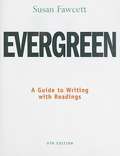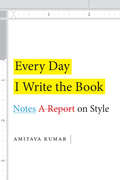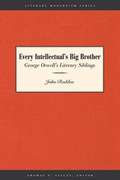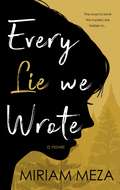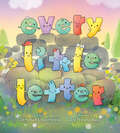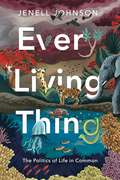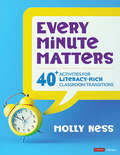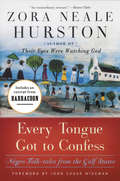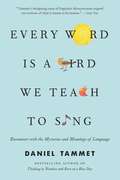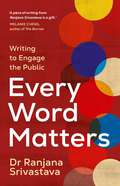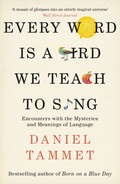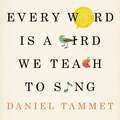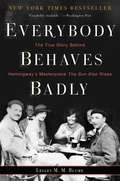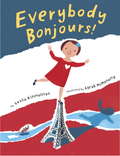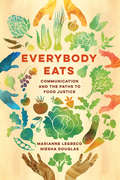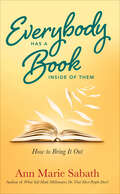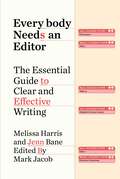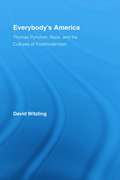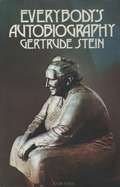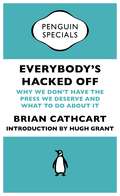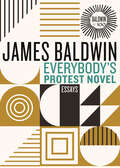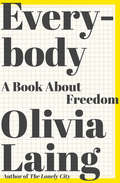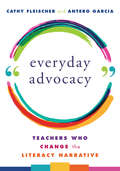- Table View
- List View
Evergreen: A Guide to Writing with Reading (9th edition)
by Susan FawcettEVERGREEN combines carefully crafted instruction, high-interest readings and student models, and plentiful practice exercises, to provide the most effective paragraph-to-essay-level Developmental Writing text on the market. The Ninth Edition includes expanded and revised coverage of writing essays, including an additional essay chapter and numerous additional student models. Photos enhance high-interest readings and promote critical viewing as well as critical thinking and clear writing.
Every Day I Write the Book: Notes on Style
by Amitava KumarAmitava Kumar's Every Day I Write the Book is for academic writers what Annie Dillard's The Writing Life and Stephen King's On Writing are for creative writers. Alongside Kumar's interviews with an array of scholars whose distinct writing offers inspiring examples for students and academics alike, the book's pages are full of practical advice about everything from how to write criticism to making use of a kitchen timer. Communication, engagement, honesty: these are the aims and sources of good writing. Storytelling, attention to organization, solid work habits: these are its tools. Kumar's own voice is present in his essays about the writing process and in his perceptive and witty observations on the academic world. A writing manual as well as a manifesto, Every Day I Write the Book will interest and guide aspiring writers everywhere.
Every Intellectual's Big Brother: George Orwell's Literary Siblings
by John RoddenBy examining the politics of literary reception as a dimension of cultural history, John Rodden gives us a better understanding of Orwell's unique and enduring role in Anglo-American intellectual life.
Every Lie We Wrote
by Miriam MezaIt all started with a lie… When I saw you for the first time I fell in love with your wild spirit, with how free you were and what you made me feel. But it was all a lie, wasn’t it? Just one of the thousands we told. It was easier to pretend and ignore the signs. It was easier to write each other letters and hold hands. But that was my mistake, I guess. Going along with your game. Now you’re gone… One day you simply disappeared, turning my world upside down. There’s not a single place left where they haven’t looked for you, and no one seems to know where you are. You vanished without a trace, and now everyone looks at me in suspicion because, according to them, no one knows you like I do. Your leaving is a mystery to everyone. What they don’t know is that there’s an even bigger mystery. And that’s you. But don’t worry, Liv. Because whatever it takes, I’m going to find you.
Every Little Letter
by Deborah UnderwoodFor fans of The Word Collector and Be Kind comes a story of words, walls, and widening your world, by New York Times bestselling author Deborah UnderwoodSmall h has always lived with the other H's in a city surrounded by walls that keep them safe. At least, that's what the big H's say. But one day, a hole in the wall reveals someone new on the other side. When little h and little i meet, they make a small word with big meaning: "hi!" The other H's find out, though. They fill the hole. But it won't be enough to keep these little letters apart--or twenty-four of their newest friends. Every Little Letter shows how even the smallest among us can make a big impact, and how a single act of friendship can inspire whole communities to come together. How do you tear down walls? With words, at first. Then brick by brick."Rich for exploration . . . Adorable." --SLJ (starred review)"This message of friendship . . . bears repeating, especially for the youngest readers." --Kirkus"Smartly executed . . . Underlines how diversity leads to strength." --Publishers Weekly"This [book] goes beyond to incorporate the alphabet and word-learning, as well as the importance of listening to young people." --Shelf Awareness
Every Living Thing: The Politics of Life in Common (RSA Series in Transdisciplinary Rhetoric)
by Jenell JohnsonThis book examines the question of what we mean when we talk about life, revealing new insights into what life is, what it does, and why it matters. Jenell Johnson studies arguments on behalf of life—not just of the human or animal variety, but all life. She considers, for example, the Standing Rock Sioux tribe’s fight for water, deep ecologists’ Earth First! activism, the Voluntary Human Extinction Movement, and astrophysicists’ positions on Martian microbes. What she reveals is that this advocacy—vital advocacy—expands our view of what counts as life and shows us what it would mean for the moral standing of human life to be extended to life itself.Including short interviews with celebrated ecological writer Dorion Sagan, former NASA Planetary Protection Officer Catharine Conley, and leading figure in Indigenous and environmental studies Kyle Whyte, Every Living Thing provides a capacious view of life in the natural world. This book is a must-read for anyone interested in biodiversity, bioethics, and the environment.
Every Minute Matters [Grades K-5]: 40+ Activities for Literacy-Rich Classroom Transitions (Corwin Literacy)
by Molly K. NessMake the most of every instructional minute with engaging literacy activities Time—or lack thereof—may be the most precious commodity in the classroom. From covering all the necessary curriculum and imparting life skills to attending meetings and answering emails, educators are faced with real challenges when there never seems to be enough time to do it all. Although teachers don’t have the power to create more minutes in the school day, they do have the power to be effective and efficient with the time given. Molly Ness asks teachers first to examine their use of time in the classroom in order to make more space for literacy. She then introduces 40 innovative activities designed to replace seatwork. These literacy-rich alternatives for classroom transitions are presented alongside Research on instructional time in K–5 classrooms Strategies for how to maximize every minute of instruction Suggestions for improving efficiency to expand independent reading and writing time Reflective practices to help teachers examine how they use the time they have The instructional day is ripe for redesign with a thoughtful and authentic time audit. Every Minute Matters guides educators through that process by outlining literacy-rich activities to optimize transitional times and minimize lost instructional minutes.
Every Minute Matters [Grades K-5]: 40+ Activities for Literacy-Rich Classroom Transitions (Corwin Literacy)
by Molly K. NessMake the most of every instructional minute with engaging literacy activities Time—or lack thereof—may be the most precious commodity in the classroom. From covering all the necessary curriculum and imparting life skills to attending meetings and answering emails, educators are faced with real challenges when there never seems to be enough time to do it all. Although teachers don’t have the power to create more minutes in the school day, they do have the power to be effective and efficient with the time given. Molly Ness asks teachers first to examine their use of time in the classroom in order to make more space for literacy. She then introduces 40 innovative activities designed to replace seatwork. These literacy-rich alternatives for classroom transitions are presented alongside Research on instructional time in K–5 classrooms Strategies for how to maximize every minute of instruction Suggestions for improving efficiency to expand independent reading and writing time Reflective practices to help teachers examine how they use the time they have The instructional day is ripe for redesign with a thoughtful and authentic time audit. Every Minute Matters guides educators through that process by outlining literacy-rich activities to optimize transitional times and minimize lost instructional minutes.
Every Step She Takes: Who's Watching Now 2 (Who's Watching Now)
by Jannine GallantFans of Karen Rose, Cynthia Eden, Kaylea Cross and Pamela Clare will love Jannine Gallant's brilliant blend of exciting suspense and emotional romance, with real characters caught in extraordinary circumstances. You can run from the past, but you can't hide... Tough as nails, no nonsense San Francisco reporter Grace Hanover will do anything to cover the story of the decade - and her career. Having survived a painful past, she's learned never to let anything stand in her way. Even if it means following a key witness into the Alaskan wilderness, and partnering with Travis Barnett, a former Navy SEAL turned PI who's working for the Feds, and who would love to bring in Grace's witness before she can get her story. But together in the wilderness, they'll each have to put aside their differences and trust one another if they want to survive. Because someone from Grace's past is watching, waiting for just the right moment. Every step Grace takes draws her deeper into the line of fire, and into the hands of a killer...Looking for more danger and drama? Don't miss the other Who's Watching Now titles, Every Move She Makes and Every Vow She Breaks.
Every Tongue Got to Confess
by Zora Neale HurstonEvery Tongue Got to Confess is an extensive volume of African American folklore that Zora Neale Hurston collected on her travels through the Gulf States in the late 1920s.The bittersweet and often hilarious tales -- which range from longer narratives about God, the Devil, white folk, and mistaken identity to witty one-liners -- reveal attitudes about faith, love, family, slavery, race, and community. Together, this collection of nearly 500 folktales weaves a vibrant tapestry that celebrates African American life in the rural South and represents a major part of Zora Neale Hurston's literary legacy.
Every Word Is a Bird We Teach to Sing: Encounters with the Mysteries and Meanings of Language
by Daniel TammetA mind-expanding, deeply humane tour of language by the bestselling author of Born on a Blue Day and Thinking in Numbers.Is vocabulary destiny? Why do clocks "talk" to the Nahua people of Mexico? Will A.I. researchers ever produce true human-machine dialogue? In this mesmerizing collection of essays, Daniel Tammet answers these and many other questions about the intricacy and profound power of language. In Every Word Is a Bird We Teach to Sing, Tammet goes back in time to London to explore the numeric language of his autistic childhood; in Iceland, he learns why the name Blær became a court case; in Canada, he meets one of the world's most accomplished lip readers. He chats with chatbots; contrives an "e"-less essay on lipograms; studies the grammar of the telephone; contemplates the significance of disappearing dialects; and corresponds with native Esperanto speakers - in their mother tongue. A joyous romp through the world of words, letters, stories, and meanings, Every Word Is a Bird We Teach to Sing explores the way communication shapes reality. From the art of translation to the lyricism of sign language, these essays display the stunning range of Tammet's literary and polyglot talents.
Every Word Matters: Writing to Engage the Public
by Dr Ranjana SrivastavaEvery Word Matters is an essential guide for writers who want to make a difference. Renowned for her insightful columns in the Guardian, Dr Ranjana Srivastava brings her signature clarity and intelligence to the art of writing opinion columns, advocacy pieces and essays. With wisdom and warmth, she skilfully guides readers through the challenges and rewards of writing. From simplifying complex ideas to developing a distinctive voice and engaging the audience, Srivastava offers practical advice drawn from her own experiences of both setbacks and successes. Whether your goal is to educate, inspire, or advocate, this book will help you transform your ideas into compelling writing. What makes Every Word Matters especially powerful is Srivastava&’s dual perspective as both an oncologist and a writer, giving her a unique understanding of the power of language to inform, persuade and heal. A must read for aspiring writers, professionals, and anyone curious about the writing process, Every Word Matters is a powerful reminder of why writing well truly matters.
Every Word is a Bird We Teach to Sing: Encounters with the Mysteries & Meanings of Language
by Daniel Tammet'Full of charm and fascination' The Bookseller'Would dazzle any storyteller in love with words and their deepest meanings' Amy Tan, author of Joy Luck Club'A generous book and a beguiling read' Rebecca Gowers* * * * * *From the bestselling author of Born on a Blue Day and Thinking in Numbers, a delightful and eclectic exploration of language, and what it can teach us about ourselves and our lives.Why is the name 'Cleopatra' not allowed in Iceland? Why do clocks 'talk' to the Nahua people of Mexico? And if we are what we eat, are we also what we say? These are just some of the questions Daniel Tammet answers in Every Word is a Bird We Teach to Sing, a mesmerising new collection of essays investigating the intricacies and profound power of human language. Tammet goes back in time to explore the numeric language of his autistic childhood; he looks at the music and patterns that words make, and how languages evolve and are translated. He meets one of the world's most accomplished lip readers in Canada, learns how endangered languages like Manx are being revived and corresponds with native speakers of Esperanto in their mother tongue. He studies the grammar of the telephone, contemplates the significance of disappearing dialects, and also asks: will chatbots ever manage to convince us that they are human?From the art of translation to the lyricism of sign language, Every Word is a Bird We Teach to Sing is a fascinating journey through the world of words, letters, stories and meanings, and an extraordinary testament to the stunning range of Tammet's literary and polyglot talents.
Every Word is a Bird We Teach to Sing: Encounters with the Mysteries & Meanings of Language
by Daniel Tammet'Full of charm and fascination . . . a veritable verbal treasure house' -The BooksellerA mind-expanding, deeply humane tour of language(s) - and those who speak, study, and invent them - by the bestselling author of Born on a Blue Day and Thinking in Numbers.Is vocabulary destiny? Why do clocks 'talk' to the Nahua people of Mexico? Will A.I. researchers ever produce true human-machine dialogue? In this mesmerizing collection of essays, Daniel Tammet answers these and many other questions about the intricacy and profound power of language. In Every Word Is a Bird We Teach to Sing, Tammet goes back in time to explore the numeric language of his autistic childhood; in Iceland, he learns why the name Blær became a court case; in Canada, he meets one of the world's most accomplished lip readers. He chats with chatbots; contrives an 'e'-less essay on lipograms; studies the grammar of the telephone; contemplates the significance of disappearing dialects; and corresponds with native Esperanto speakers - in their mother tongue. A joyous romp through the world of words, letters, stories, and meanings, Every Word Is a Bird We Teach to Sing explores the way communication shapes reality. From the art of translation to the lyricism of sign language, these essays display the stunning range of Tammet's literary and polyglot talents.(P)2017 Hodder & Stoughton
Everybody Behaves Badly: The True Story Behind Hemingway's Masterpiece The Sun Also Rises
by Lesley M. BlumeThe New York Times bestseller. &“Fiendishly readable . . . a deeply, almost obsessively researched biography of a book.&”—The Washington PostIn the summer of 1925, Ernest Hemingway and a clique of raucous companions traveled to Pamplona, Spain, for the town&’s infamous running of the bulls. Then, over the next six weeks, he channeled that trip&’s maelstrom of drunken brawls, sexual rivalry, midnight betrayals, and midday hangovers into his groundbreaking novel The Sun Also Rises. This revolutionary work redefined modern literature as much as it did his peers, who would forever after be called the Lost Generation. But the full story of Hemingway&’s legendary rise has remained untold until now.Lesley Blume resurrects the explosive, restless landscape of 1920s Paris and Spain and reveals how Hemingway helped create his own legend. He made himself into a death-courting, bull-fighting aficionado; a hard-drinking, short-fused literary genius; and an expatriate bon vivant. Blume&’s vivid account reveals the inner circle of the Lost Generation as we have never seen it before and shows how it still influences what we read and how we think about youth, sex, love, and excess.&“Totally captivating, smartly written, and provocative.&”—Glamour&“[A] must-read . . . The boozy, rowdy nights in Paris, the absurdities at Pamplona&’s Running of the Bulls and the hungover brunches of the true Lost Generation come to life in this intimate look at the lives of the author&’s expatriate comrades.&”—Harper&’s Bazaar &“A fascinating recreation of one of the most mythic periods in American literature—the one set in Paris in the &’20s.&”—Jay McInerney
Everybody Bonjours!
by Leslie Kimmelman Sarah McmenemyShop a fancy France-y store. Eat a pretty petit four. Discover! Sightsee! Explore! On this fun and friendly tour, everybody says "Bonjour!" Whether at a soccer stadium ("players scoring"), a crêpe stand ("batter pouring"), or strolling the Champs d' Elysee (where folks "bonjour" in every store), a little girl and her family are welcomed everywhere with the signature French greeting. Jump into these pages and enjoy the trip! Through lilting words and lively images, Everybody Bonjours welcomes young reader-travelers to a Paris that isn't just for artists, grown-ups, and dreamers- it's for kids!
Everybody Eats: Communication and the Paths to Food Justice (Communication for Social Justice Activism #3)
by Marianne LeGreco Niesha DouglasEverybody Eats tells the story of food justice in Greensboro, North Carolina—a midsize city in the southern United States. The city's residents found themselves in the middle of conversations about food insecurity and justice when they reached the top of the Food Research and Action Center's list of major cities experiencing food hardship. Greensboro's local food communities chose to confront these high rates of food insecurity by engaging neighborhood voices, mobilizing creative resources at the community level, and sustaining conversations across the local food system. Within three years of reaching the peak of FRAC's list, Greensboro saw an 8 percent drop in its food hardship rate and moved from first to fourteenth in FRAC's list. Using eight case studies of food justice activism, from urban farms to mobile farmers markets, shared kitchens to food policy councils, Everybody Eats highlights the importance of communication—and communicating social justice specifically—in building the kinds of infrastructure needed to create secure and just food systems.
Everybody Has a Book Inside of Them: How to Bring It Out
by Ann Marie SabathYou have undoubtedly read books by many esteemed prolific authors, but have you ever wished you could get inside their minds and learn how to bring out the book inside of YOU? In Everybody Has a Book Inside of Them, you will do just that. You will learn firsthand from Ann Marie Sabath and her army of author colleagues the answers to the questions you've always wanted to ask about the writing process. Whether it is how to get your writing motor revved, rid yourself of those dirty writing doubts, or learn the power of KITA for meeting deadlines, Sabath will show you how to make your dream of becoming an author a reality. Some of the 40 topics addressed are: •How long does it take to write a book?•Why knowing your reader is a must before you begin•What motivates authors? Love or money?•When to stop writing while you are ahead•What seasoned authors would tell their younger selves•How a bestselling author structures their bookWith her honesty, sense of humor, and encouragement, Ann Marie will bring you several steps closer to bringing out that book in you. Her easy-to-follow guidelines, trade tips, and valuable insights from other experienced authors will get your writing engine revved. In reading Sabath's guide, you will find the voice of a compassionate coach who simply will not let you get away with NOT writing a book of your own.
Everybody Needs an Editor: The Essential Guide to Clear and Effective Writing
by Jenn Bane Melissa HarrisWedding toasts, website copy, social media posts, even holiday cards—you&’ll become a sharper everyday writer with this witty and comprehensive guide to clearer, better communication.You&’ll never write an email the same way after reading Everybody Needs an Editor, a game-changing guide to sharp, attention-getting writing. The authors use their decades of real-life journalism and marketing expertise to demonstrate the WTFF technique: Writing, Topping, Formatting, and Fixing. You&’ll learn how to eviscerate your own writing—and enjoy doing so. You&’ll learn to create must-click subject lines, cut jargon, and write emails that people will actually read and remember. If you&’ve ever felt nervous to hit a &“submit&” button, this book is for you.
Everybody's America: Thomas Pynchon, Race, and the Cultures of Postmodernism (Studies In Major Literary Authors Ser.)
by David WitzlingEverybody’s America reassesses Pynchon’s literary career in order to explain the central role played by the racialization of American culture in the postmodernist deconstruction of subjectivity and literary authority and in the crisis in white liberal culture. It charts the evolution of both these cultural transformations from Pynchon’s early short stories, composed in the late 1950s, through Gravity’s Rainbow, published in 1973. This book demonstrates that Pynchon deploys techniques associated with the decentering of the linguistic sign and the fragmentation of narrative in order to work through the anxieties of white male subjects in their encounter with racial otherness. It also charts Pynchon’s attention to non-white and non-Euro-American voices and cultural forms, which imply an awareness of and interest in processes of transculturation occurring both within U.S. borders and between the U.S. and the Third World. In these ways, his novels attempt to acknowledge the implicit racism in many elements of white American culture and to grapple with the psychological and sociopolitical effects of that racism on both white and black Americans. The argument of Everybody’s America, however, also considers the limits of Pynchon’s implicit commitment to hybridity as a social ideal, identifying attitudes expressed in his work that suggest a residual attraction to the mainstream liberalism of the fifties and early sixties. Pynchon’s fiction dramatizes the conflict between the discourses and values of such liberalism and those of an emergent multiculturalist ethos that names and valorizes social difference and hybridity. In identifying the competition between residual liberalism and an emergent multiculturalism, Everybody’s America makes its contribution to the broader understanding of postmodern culture.
Everybody's Autobiography
by Gertrude SteinEverybodys Autobiography is among the very best of Gertrudes writing--[it] speaks with the true and original voice of Gertrude Stein, without apparent art or bravado. --Janet Hobhouse~In 1937, Gertrude Stein wrote a sequel to The Autobiography of Alice B. Toklas, but this darker and more complex work was long misunderstood and neglected. An account of her experiences as a result of writing a bestseller, Everybodys Autobiography is as funny and engaging as The Autobiography of Alice B. Toklas, but it is also a searing meditation on the meaning of success and identity in America. Posing as the representative American, Stein transforms her story into history--responding to the tradition of Thoreau and Henry Adams, she writes: "I used to be fond of saying that America, which was supposed to be a land of success, was a land of failure. Most of the great men in America had a long life of early failure and a long life of later failure. " Everybodys Autobiography is Stein at her most accessible and her most serious, and may yet prove to be among her most popular books.
Everybody's Hacked Off: Why We Don't Have the Press we Deserve and What to Do About It (Penguin Specials)
by Brian Cathcart Hugh GrantA brilliantly written, concise and accessible summary of the Leveson inquiry and a convincing argument for why we need press reform from an expert on the subject, with an introduction by Hugh Grant, a Hacked Off campaigner, recent witness at the Leveson inquiry and presenter of the Channel 4 documentary Taking on the Tabloids.When most of the British press conspired to cover up the phone-hacking scandal at the News of the World, what did that tell us? That it wasn't just the News of the World that had something to hide. And when the Leveson Inquiry lifted the lid on their activities we saw what it was: illegal practices, dishonesty, a disregard for the rights of ordinary people and an arrogant assumption of unaccountability. Now the battle is on to decide whether anything will change and the editors and proprietors, with their vast propaganda power, are determined to ensure nothing will. This book, by a long-time journalist who is a founder of the Hacked Off campaign, paints a damning picture of press corruption and makes a passionate case for journalism that doesn't bully and lie - journalism that is truly answerable to the public while remaining free from government interference. We have a once-in-a-lifetime opportunity to get this right, and we must not allow powerful media corporations to snatch that chance from us.
Everybody's Protest Novel: Essays
by James Baldwin"I am completely indebted to Jimmy Baldwin&’s prose. It liberated me as a writer."—Toni MorrisonThis collectible edition celebrates James Baldwin&’s 100th-year anniversary, probing the shortcomings of the American protest novel and the harmful representations of Black identity in film and fictionOriginally published in Notes of a Native Son, the essays "Autobiographical Notes," "Everybody's Protest Novel," "Many Thousands Gone," and "Carmen Jones: The Dark is Light Enough," showcase Baldwin's incisive voice as a social and literary critic.&“Autobiographical Notes&” outlines Baldwin&’s journey as a Black writer and his hesitant transition from fiction to nonfiction. In the following essays, Baldwin explores the Black experience through the lens of popular media, critiquing the ways in which Black characters—in Harriet Beecher Stowe&’s novel Uncle Tom&’s Cabin, Richard Wright&’s novel Native Son, and the 1950s film Carmen Jones—are reduced to digestible caricatures.Everybody&’s Protest Novel: Essays is the first of three special editions in the James Baldwin centennial anniversary series. Through this collection, Baldwin examines the facade of progress present in the novels of Black oppression. These essays showcase Baldwin&’s profound ability to reveal the truth of the Black experience, exposing the failure of the protest novel, and the state of racial reckoning at the dawn of the Civil Rights Movement.
Everybody: A Book About Freedom
by Olivia Laing"Astute and consistently surprising critic" (NPR) Olivia Laing investigates the body and its discontents through the great freedom movements of the twentieth century. The body is a source of pleasure and of pain, at once hopelessly vulnerable and radiant with power. In her ambitious, brilliant sixth book, Olivia Laing charts an electrifying course through the long struggle for bodily freedom, using the life of the renegade psychoanalyst Wilhelm Reich to explore gay rights and sexual liberation, feminism, and the civil rights movement. Drawing on her own experiences in protest and alternative medicine, and traveling from Weimar Berlin to the prisons of McCarthy-era America, Laing grapples with some of the most significant and complicated figures of the past century—among them Nina Simone, Christopher Isherwood, Andrea Dworkin, Sigmund Freud, Susan Sontag, and Malcolm X. Despite its many burdens, the body remains a source of power, even in an era as technologized and automated as our own. Arriving at a moment in which basic bodily rights are once again imperiled, Everybody is an investigation into the forces arranged against freedom and a celebration of how ordinary human bodies can resist oppression and reshape the world.
Everyday Advocacy: Teachers Who Change The Literacy Narrative
by Cathy Fleischer Antero GarciaWhat counts as professionalism for teachers today? Once, teachers who knew their content area and knew how to teach it were respected as professionals. Now there is an additional type of competency required: in addition to content and pedagogical knowledge, educators need advocacy skills. In this groundbreaking collection, literacy educators describe how they are redefining what it means to be a teaching professional. Teachers share how they are trying to change the conversation surrounding literacy and literacy instruction by explaining to colleagues, administrators, parents, and community members why they teach in particular research-based ways, so often contradicted by mandated curricula and standardized assessments. Teacher educators also share how they are introducing an advocacy approach to preservice and practicing teachers, helping prepare teachers for this new professionalism. Both groups practice what the authors call “everyday advocacy”: the day-to-day actions teachers are taking to change the public narrative surrounding schools, teachers, and learning.
